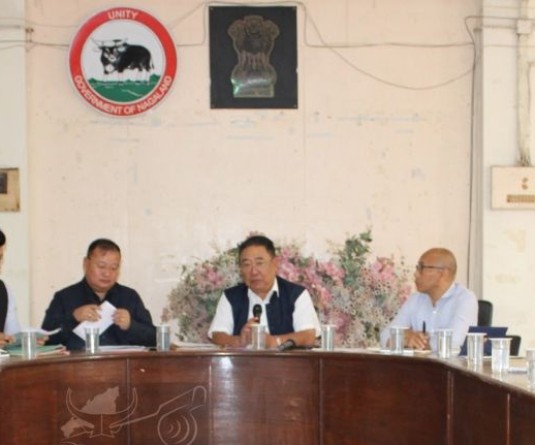
Kohima, February 23 (MExN): The Nagaland Baptist Church Council (NBCC) has expressed deep concern over what it termed the initiative to revisit the ‘Anti-Conversion Bill of 1978’ by the Government of Arunachal Pradesh.
In a letter addressed to Arunachal Pradesh Chief Minister Pema Khandu, via its General Secretary Rev Dr Zelhou Keyho, the NBCC pointed out that the relationship between the peoples of the two states runs deep, and the Christian community in particular shares close ties.
“Therefore, when one is bleeding, it is our responsibility to stand up for each other in such times,” the letter read.
On behalf of the Christian community and in a spirit of brotherhood and sisterhood, the NBCC highlighted that India’s Freedom of Religion Acts, or “Anti-Conversion” laws, are state-level statutes enacted to regulate religious conversions.
The laws were in force in eight states over four decades ago – Odisha, Madhya Pradesh, Chhattisgarh, Gujarat, Himachal Pradesh, Jharkhand and Uttarakhand – and in Arunachal Pradesh, the only North-Eastern state.
However, the council reminded that Arunachal was not able to “implement the Bill successfully” and the Chief Minister is clearly aware of the reason.
“The region has come out strongly in protest of the Act because politics was at play at that time to suppress the people of Arunachal and the region,” it asserted.
According to the NBCC, Arunachal was used as a testing ground for the political motives underlying the Act, adding that the real intention of the “Anti-Conversion Bill” was not to preserve traditional religion but to suppress a particular religious group of those days.
The bill was also opposed by people in the region, regardless of their religious affiliation, as they recognised its detrimental effect on the peaceful coexistence of North-Eastern people, who freely enjoy freedom of speech, religion and association, it added.
Thus, the NBCC said it was unfortunate that after more than four decades, the state has once again come under the spotlight.
Currently, a lot has changed in the country, and the law is misused to unnecessarily persecute Christians in other parts of the country, it alleged.
“Our common sense tells us that the same will happen to your peace-loving people, and this will spill over to the whole region,” it added.
For these reasons, Christians and the public have protested against the Bill proposed for introduction in the state of Arunachal.
“The reason why the Bill was not fully implemented was not due to any technical interpretation but because there was strong opposition in Arunachal and the region. The same sentiment is still expressed today,” it asserted.
The NBCC also noted that the rhetoric at the time was that the ‘Anti-Conversion Bill’ in Arunachal would differ from those in the mainline states. However, it asserted that this is never the case, as the state’s anti-conversion provisions are contained in the Arunachal Pradesh Freedom of Religion Act, 1978, and are similar to those enacted in Orissa and Madhya Pradesh.
The law, which was passed in view of the perceived threat to indigenous religions, received presidential assent on 25 October 1978, it added.
The NBCC also stated that for the past four decades the state has maintained the law, attributing this to “positive leadership that respects the sentiment and feelings of the people.”
During the intervening period, Arunachal has progressed in many areas and has become a state that reflects the image of the region.
“Your people and your state, in general, have been accommodating to people of different religious groups, and freedom has thrived in your state,” the NBCC pointed out to the Chief Minister.
However, the situation is concerning as the four-decade cold storage is thawing once again, it added.
Regarding the Chief Minister’s reported assurance that the Act in no way targets any particular religious group but is merely “to protect traditional religions,” the NBCC held that, while such assurances are welcome, he has a responsibility to explain to the people “where the bullet will fall if there is no target?”
“Arunachal is not solely a state of traditional or indigenous religion, and the Anti-Conversion Act cannot be used to preserve indigenous heritage, which is an entirely separate matter,” it added. The state must include a proper clause to preserve and protect its rich cultural heritage.
The NBCC also contended that reviving an Act that has failed for decades amounts to “bad politics, and the intention can only be assumed.”
Describing it as insensitive to the voice of the people, the NBCC requested the Chief Minister to be “sensitive to the Christians who have relentlessly stood on behalf of the region to repeal the Bill so that it does not become an offence punishable by law.”
It also reminded that Anti-Conversion laws are problematic because they violate secularism and the religious freedom guaranteed under the Fundamental Rights. Furthermore, such laws would have multiple implications and infringe upon personal choice and freedom.
As a peace-loving region, the NBCC prayed for the Chief Minister’s wisdom and courage in providing sensitive and considerate leadership.
As a neighbour, the NBCC stated that it shares the woes and concerns expressed by the Christians in Arunachal, as their brothers and sisters.






